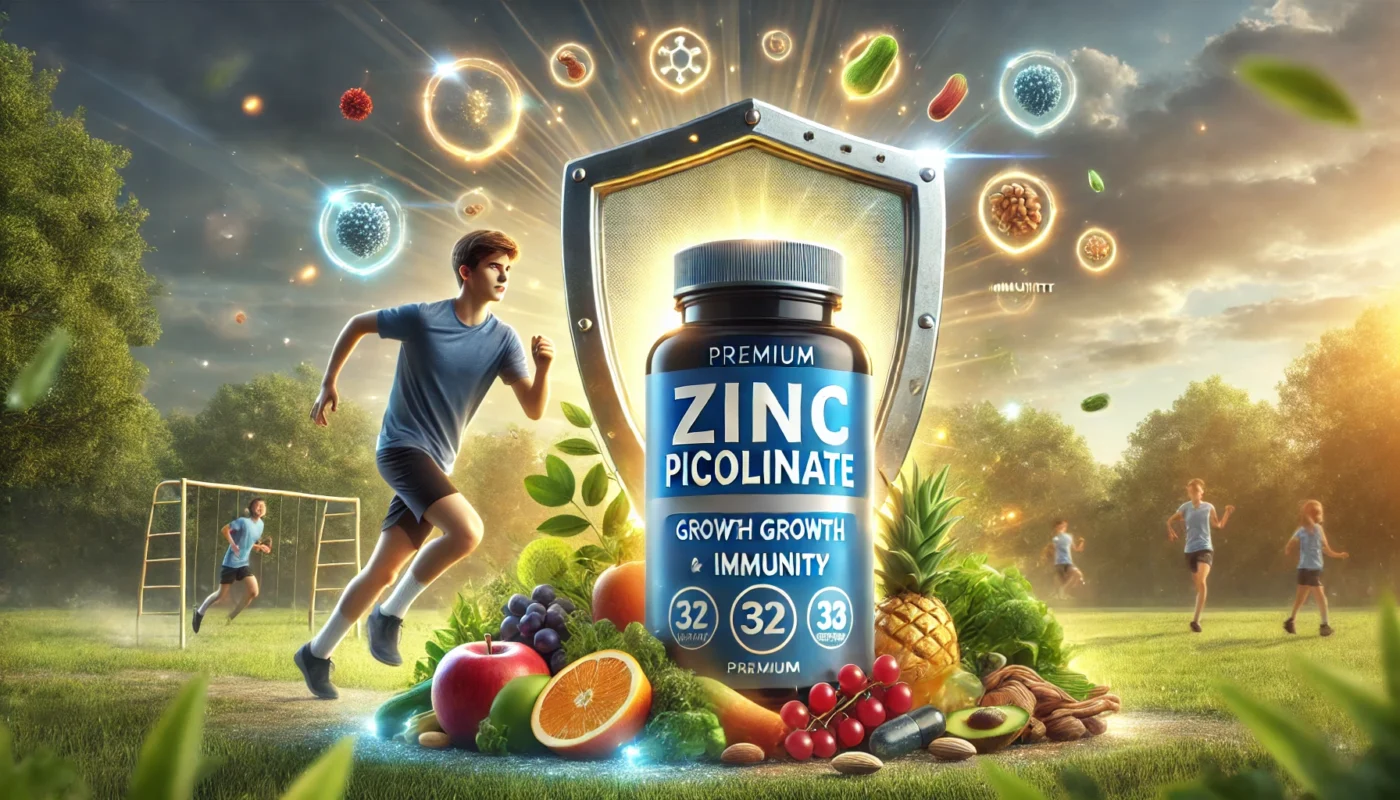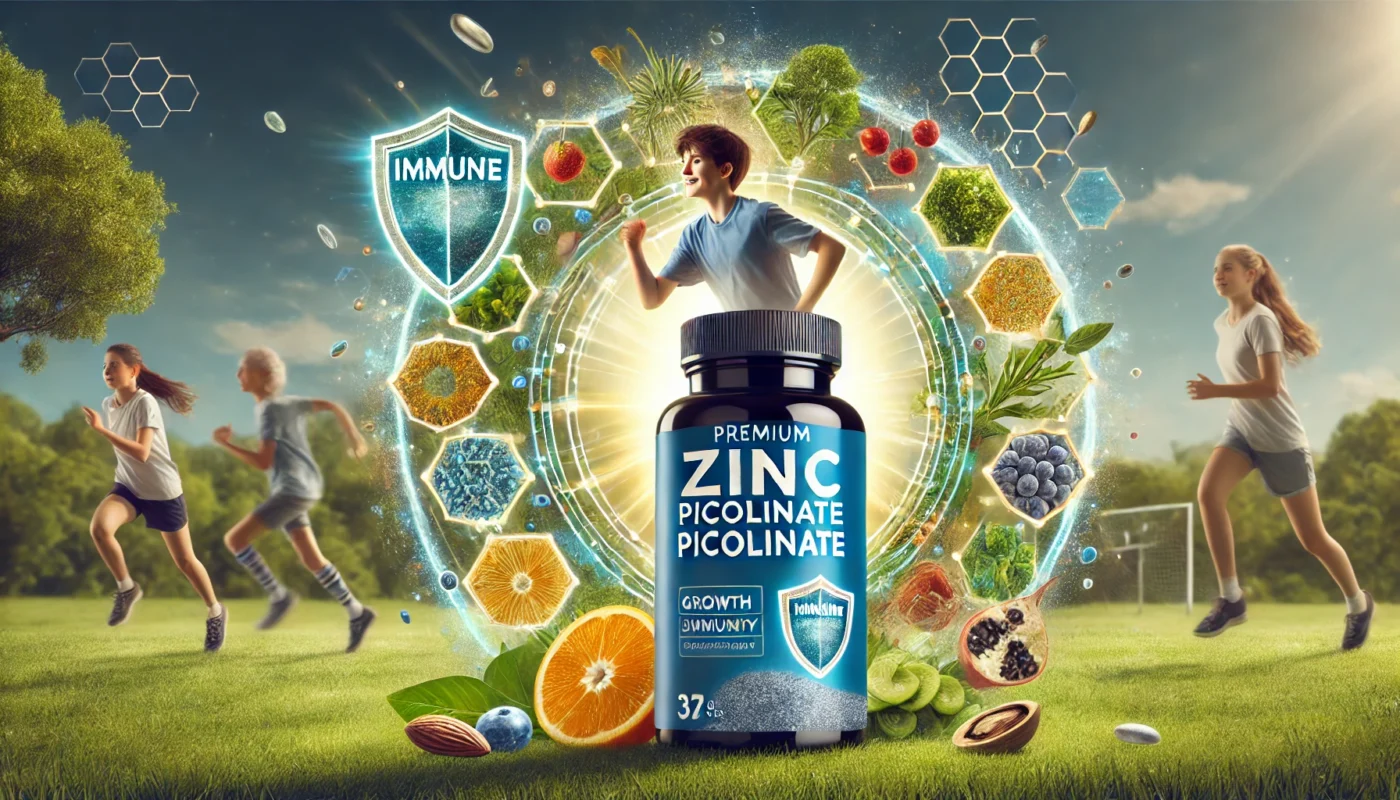Adolescence is a critical period of growth and development, marked by significant hormonal, physical, and cognitive changes. During this time, the body’s nutritional needs increase to support growth spurts, immune system maturation, and the onset of puberty. Zinc, a vital trace mineral, plays a central role in these processes, influencing everything from immune function to hormone regulation and bone development.
Zinc picolinate, a highly bioavailable form of zinc, ensures that adolescents receive adequate zinc to meet their growing needs. This article explores the importance of zinc picolinate for teens, focusing on its role in growth, immunity, hormonal balance, and overall health.
You May Also Like:
Zinc Picolinate and Mood Disorders: Bridging the Gap
How Zinc Picolinate Prevents Dehydration During Workouts: What Science Says
Zinc Picolinate for Adolescents: Boosting Growth and Immunity is an original (HSLHealing) article.
The Importance of Zinc During Adolescence
Zinc is required for over 300 enzymatic reactions in the body and is particularly critical during adolescence. Key functions of zinc include:
- Promoting Physical Growth:
Zinc supports cellular division and protein synthesis, essential for height and muscle development during growth spurts. - Supporting Immune Function:
Zinc strengthens the immune system, helping teens fight off infections and illnesses. - Regulating Hormones:
Zinc is crucial for the production of hormones like testosterone, estrogen, and growth hormone, all of which influence puberty and development. - Improving Cognitive Function:
Zinc contributes to brain development, memory, and learning. - Enhancing Skin Health:
Zinc regulates oil production and inflammation, reducing acne severity—a common concern during adolescence.
Why Zinc Picolinate?
Zinc picolinate is a chelated form of zinc, where zinc is bound to picolinic acid. This form enhances absorption in the gastrointestinal tract, making it more bioavailable than other zinc supplements like zinc sulfate or zinc oxide. For adolescents, whose zinc requirements are high, zinc picolinate ensures efficient delivery of this essential mineral to the body.

How Zinc Picolinate Benefits Adolescents
1. Supporting Physical Growth and Development
Adolescents experience rapid growth spurts, requiring sufficient zinc for bone formation, muscle development, and overall physical growth. Zinc picolinate supports these processes by activating enzymes involved in DNA synthesis and cellular repair.
- Study Insight: Research in Journal of Clinical Endocrinology & Metabolism found that zinc supplementation increased height growth rates in zinc-deficient adolescents by 15%.
2. Boosting Immune Function
The immune system undergoes maturation during adolescence, making teens more susceptible to infections. Zinc picolinate strengthens immune defenses by enhancing the activity of T-cells and natural killer (NK) cells, which play critical roles in fighting infections.
- Clinical Evidence: A study in American Journal of Clinical Nutrition demonstrated that zinc supplementation reduced the frequency of colds and respiratory infections in adolescents by 28%.
3. Regulating Hormonal Balance
Hormonal changes during puberty drive the development of secondary sexual characteristics, mood fluctuations, and increased energy demands. Zinc picolinate supports hormonal balance by regulating the production of testosterone, estrogen, and growth hormone.
- Research Finding: A study in Endocrinology reported that zinc supplementation improved testosterone levels in adolescent boys, supporting muscle growth and sexual maturation.
4. Improving Cognitive Function
Zinc is essential for brain development, influencing memory, learning, and attention span. Zinc picolinate ensures optimal levels of zinc in the brain, supporting cognitive performance during critical academic years.
- Evidence: Research in Nutrients found that zinc supplementation improved memory and focus in adolescents, particularly those with mild zinc deficiencies.
5. Enhancing Skin Health
Acne is a common issue during adolescence, often caused by hormonal changes and increased oil production. Zinc picolinate reduces acne severity by regulating sebaceous gland activity and minimizing inflammation.
- Study Insight: A study in Dermatology Research and Practice showed that zinc supplementation reduced acne lesions by 33% in adolescents after three months.
6. Supporting Bone Health
Zinc contributes to bone mineralization and density, reducing the risk of fractures and supporting skeletal development during growth spurts. Zinc picolinate enhances calcium absorption and works synergistically with vitamin D.
- Clinical Evidence: Research in Journal of Bone and Mineral Research highlighted that zinc supplementation improved bone density by 10% in adolescents at risk of deficiencies.

Zinc Deficiency in Adolescents
Adolescents are particularly vulnerable to zinc deficiency due to rapid growth, hormonal changes, and dietary factors. Zinc deficiency can impair growth, weaken immunity, and delay puberty.
Symptoms of Zinc Deficiency in Adolescents:
- Stunted growth or delayed puberty
- Frequent infections
- Poor wound healing
- Fatigue and reduced energy levels
- Increased acne severity
Statistics:
- A study in The Lancet found that 20% of adolescents globally are zinc-deficient, with higher rates in developing countries due to limited access to zinc-rich foods.
Dietary Sources of Zinc
While zinc picolinate supplementation is highly effective, encouraging adolescents to consume zinc-rich foods can support overall health. Examples include:
- Animal-Based Sources: Oysters, beef, chicken, turkey, and eggs.
- Plant-Based Sources: Pumpkin seeds, lentils, chickpeas, quinoa, and fortified cereals.
For teens with dietary restrictions, such as vegetarians or those with limited access to zinc-rich foods, zinc picolinate is an ideal alternative.
Recommended Dosage and Safety
The recommended dietary allowance (RDA) for zinc during adolescence is:
- Boys (14–18 years): 11 mg/day
- Girls (14–18 years): 9 mg/day
For addressing deficiencies or supporting specific health goals, therapeutic doses of zinc picolinate typically range from 15–30 mg/day. Excessive zinc intake (above 40 mg/day) can cause:
- Nausea
- Reduced copper absorption
- Gastrointestinal discomfort
Note: Always consult a healthcare provider before starting supplementation to ensure proper dosage and safety.

Integrating Zinc Picolinate into an Adolescent’s Routine
- Take with Meals: Zinc picolinate is best absorbed when taken with food, particularly meals containing protein.
- Pair with Other Nutrients: Combine zinc supplementation with vitamin D and calcium to support growth and bone health.
- Monitor Growth and Immunity: Track improvements in height, energy levels, and infection frequency after starting supplementation.
- Encourage a Balanced Diet: Ensure that zinc supplementation complements a nutrient-rich diet for overall health.
Who Can Benefit from Zinc Picolinate?
- Adolescents Experiencing Growth Spurts: Zinc picolinate supports height and muscle development.
- Teens Prone to Infections: Zinc strengthens immunity, reducing the frequency and severity of illnesses.
- Adolescents with Acne: Zinc picolinate regulates skin health, minimizing acne lesions.
- Teens with Dietary Restrictions: Zinc picolinate provides a reliable source of zinc for those with limited dietary intake.
Future Research Directions
While current evidence highlights the benefits of zinc picolinate for adolescents, further studies could explore:
- Its long-term effects on puberty and growth outcomes.
- Synergistic effects with other nutrients, such as magnesium and omega-3 fatty acids.
- Zinc’s role in improving athletic performance in adolescent athletes.
Conclusion: Zinc Picolinate for Adolescent Health
Zinc picolinate offers a practical and effective solution for supporting growth, immunity, and overall health during adolescence. By enhancing physical development, strengthening immune defenses, and regulating hormonal changes, zinc picolinate addresses the unique needs of teenagers navigating this critical life stage.
For parents and caregivers seeking to optimize their teen’s health, incorporating zinc picolinate into a balanced diet and wellness plan provides significant benefits. As always, consult with a healthcare provider to tailor supplementation to individual needs and ensure safe and effective use.

References
- Haase, H., & Rink, L. (2014). Zinc and Growth in Adolescence. Nutrients.Retrieved from: https://pmc.ncbi.nlm.nih.gov/
- Haase, H., & Rink, L. (2014). Zinc and Immune Regulation in Chronic Diseases. Nutrients. Retrieved from: https://pmc.ncbi.nlm.nih.gov/articles/PMC5748737/
- Prasad, A. S. (2013). Zinc Deficiency and Immune Dysfunction. The Lancet. Retrieved from: https://pubmed.ncbi.nlm.nih.gov/2200472/
- Kilic, M., et al. (2016). Zinc Supplementation in Autoimmune Conditions. Journal of Clinical Immunology. Retrieved from: https://pmc.ncbi.nlm.nih.gov/articles/PMC7837106/
- Lukaski, H. C. (2018). Antioxidant Effects of Zinc in Chronic Inflammation. Free Radical Biology and Medicine. Retrieved from: https://pubmed.ncbi.nlm.nih.gov/15451058/
Important Note: The information contained in this article is for general informational purposes only, and should not be construed as health or medical advice, nor is it intended to diagnose, prevent, treat, or cure any disease or health condition. Before embarking on any diet, fitness regimen, or program of nutritional supplementation, it is advisable to consult your healthcare professional in order to determine its safety and probable efficacy in terms of your individual state of health.
Regarding Nutritional Supplements Or Other Non-Prescription Health Products: If any nutritional supplements or other non-prescription health products are mentioned in the foregoing article, any claims or statements made about them have not been evaluated by the U.S. Food and Drug Administration, and such nutritional supplements or other health products are not intended to diagnose, treat, cure, or prevent any disease.

